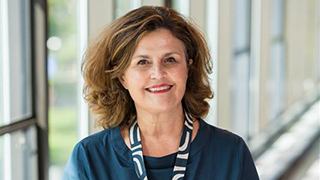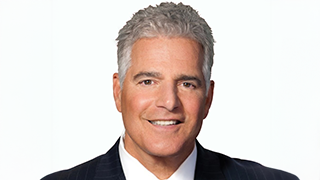Fulbright Scholar Discusses Saint Mother Teresa’s Leadership Principles With Emmy Award-Winning Broadcaster
Tuesday, June 17, 2025

Ines Angeli Murzaku, Ph.D.
Ines Angeli Murzaku, Ph.D., professor of Religion, Department of Religion, director, Catholic Studies Program, and founding chair, Department of Catholic Studies, explored the timeless lessons
of Saint Mother Teresa with Steve Adubato, author, speaker and Emmy Award-winning
broadcaster of Lessons in Leadership, along with co-host Mary Gamba. The episode can
be viewed here.
“I’ve written a book on Mother Teresa, Saint of the Peripheries, and currently I’m writing another book on Mother Teresa and her revolutions of Prayer,
Suffering, Poverty, Service and Conscience,” said Murzaku. “There is a lot of leadership
in Mother Teresa, in this diminutive woman, who has founded this wonderful Missionaries
of Charity, one of the most successful modern religious orders in the world.”
Murzaku’s latest project sprang from an invitation she and Seton Hall colleagues received
for the University to join the Microeconomics of Competitiveness (MOC) Affiliate Network, a group of more than 100 educational institutions around the world that teach and
collaborate in the areas of competition and entrepreneurship. The MOC network is part
of the Institute for Strategy and Competitiveness, a nonprofit research and education organization based at Harvard Business School
and founded by academic and business theorist Harvard Professor Michael Porter. Its
members teach following Professor Porter's MOC curriculum, which explores the determinants of competitiveness and successful economic development
viewed from a bottom-up, microeconomic perspective.
“I am a professor of historical theology, and I said, ‘Why on earth am I here?’ But
my colleagues who invited us to be a part of this network explained we need the humanities
[in MOC], we need the Catholic social teaching, although the people mostly come from
the business world,” explained Murzaku.
Murzaku, Adubato and Gamba reflected on how Murzaku’s fascination with this subject
is rooted in the example of Mother Teresa, who founded the modern religious order
of the Missionaries of Charity in the 1950s, which now has blossomed to 5,000 sisters
in 139 countries in the world.
Mother Teresa got the example, from Jesus himself. What I call ‘MOTHERS’ is her framework
of key leadership principles. M stands for mission focused. She was so mission focused
and purpose driven. Mother Teresa knew what she wanted. She had a mission; she had
a vision, and she got things done. O stands for others. Mother Teresa lived the principle
through her mission, through her apostolate, to serve others. So O stands for others,
servant leadership. What does this mean? If we unpack Mother Teresa, there you have
the servant and the leader. They are combined together.
T is testify by example; lead by example; lead by integrity. Walk the talk as business
people say. H stands for humanity but also humility because this is the focus of Mother
Teresa. Her focus is on people, and she did that in a very humble way. E is for evolve,
adapt. She was a maestro, innovative, always adapting to the new situation and also
testing the ground. She sent her nuns to serve the alcoholics, to serve the Roma people.
R stands for resolute perseverance. She had an idea. She got it done to the end. And
S of course for sacred, human dignity.
Murzaku’s next book will be a comparative study building upon both Professor Porter’s
determinates of competitiveness as well as that of Mother Teresa’s leadership principles
co-authored with Professor José Pablo Nuño de la Parra, Universidad Popular Autónoma
del Estado de Puebla, México. The upcoming study will be a “Theology of Competitiveness:
Where Competitiveness meets Compassion” affirming human dignity, promoting the common
good, and respecting creation. Murzaku believes that by adopting a “shared value”
approach, Porter’s theories can be infused with a human-centric, ethical dimension,
inspired by Mother Teresa’s unconditional respect for each human being. Consequently,
businesses and regional planners, aware of Catholic Social Teaching and Mother Teresa’s
witness, could design clusters that prioritize the poor, promote workers’ dignity,
and consciously uplift entire communities, proving that competitiveness need not exclude
compassion.
“If you read how Mother Teresa tailored her approach, for example, when she sent her
sisters to Russia or when she sent them to Calabria to serve the Roma population,
she tested the ground. She went ‘in situ’ directly to the places and interviewed people
and she built on whatever was there,” explained Murzaku. “Mother Teresa’s principles,
that people can bring home, is this message that what you do, I don’t do; I cannot
do. So, let’s do something beautiful together.”

Steve Adubato, Ph.D.
Murzaku, Adubato and Gamba reflected on how their interview taping for the June 14
and 15 broadcast took place remotely as Murzaku was pursuing her Fulbright Professorship
at Babeș-Bolyai University in Cluj-Nopoca, Romania, at the start of Easter Holy Week
in April. Her project, “Transitional Justice and Dialogue as Means to Build Peace
in Post-communist Romania," draws on her recent research in interreligious and intercultural
dialogue to bring to light new data regarding the application of transitional justice
from communism to post-communism and understanding of the experiences of those of
minority religions in a country whose majority population is of the Eastern Orthodox
faith. The significance of that research and teaching on transitional justice and
her lived experience participating in peace-building dialogue across cultures and religions positions was extremely relevant at this time.
Murzaku concluded, saying, “It is a very special year because we are celebrating Easter
together. And this university is in Romania, an Orthodox country. We are here together,
the Orthodox people and the Roman Catholics and also the Greek Catholics and at the
same time, Protestants.”
Listen to the episode of Steve Adubato’s Lessons in Leadership with Ines Angeli Murzaku.
To learn more about, Ines Angeli Murzaku’s Fulbright project, visit here.
Categories: Faith and Service, Research






